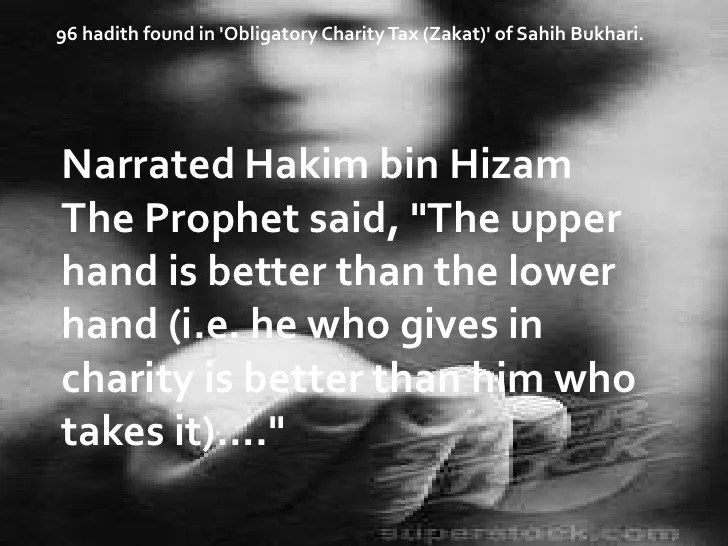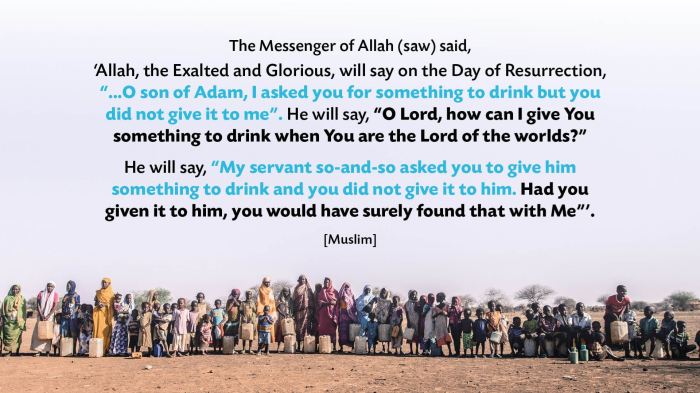Delving into the realm of hadith on poverty and kufr, this discourse unveils a profound exploration of the intricate relationship between material deprivation and the state of disbelief. Hadith, the recorded sayings and actions of Prophet Muhammad, provide invaluable insights into Islam’s perspectives on these multifaceted issues.
This discourse will delve into the Islamic understanding of poverty, defining kufr and its significance, and examining the interplay between the two as depicted in hadith. It will explore the causes and consequences of poverty, highlighting the role of kufr in contributing to its negative effects.
Hadith on Poverty and Kufr

Concept of Poverty in Islam
Poverty in Islam is not merely a lack of material wealth but a multifaceted condition that encompasses spiritual and emotional deprivation. Hadith emphasize the importance of recognizing and addressing poverty in all its forms, including financial hardship, lack of knowledge, and spiritual weakness.
Definition of Kufr
Kufr in Islamic teachings refers to the state of disbelief or rejection of faith. It encompasses a range of attitudes and actions that contradict the fundamental beliefs and practices of Islam, such as denying the existence of God, rejecting the prophethood of Muhammad, or disobeying the divine commandments.
Relationship between Poverty and Kufr
Hadith establish a strong connection between poverty and kufr. Material poverty can create conditions that make individuals more vulnerable to doubt and despair, potentially leading them astray from the path of faith. Financial hardship can also hinder access to education and religious guidance, further exacerbating spiritual deprivation.
Conversely, spiritual poverty can contribute to material poverty by limiting opportunities for personal and economic growth.
Hadith on Poverty and Kufr: Causes and Consequences

Poverty, a widespread issue affecting societies across the globe, has been addressed in numerous hadiths, providing insights into its causes and consequences. These hadiths emphasize the multifaceted nature of poverty and its close relationship with kufr, the state of disbelief or ungratefulness towards Allah.
Hadith on poverty and kufr emphasizes the importance of seeking knowledge to combat ignorance and poverty. Just as the psia level 2 pass rate reflects the significance of education in professional advancement, understanding hadith helps us navigate the complexities of life and avoid the pitfalls of ignorance and poverty.
Causes of Poverty
According to hadith, poverty can stem from various factors:
- Laziness and Inactivity:Hadiths condemn laziness and encourage hard work as essential for economic well-being. Those who neglect their responsibilities and refuse to work may face financial hardship.
- Extravagance and Waste:Excessive spending and squandering of resources can lead to depletion of wealth and poverty. Hadiths promote moderation and responsible consumption.
- Lack of Knowledge and Skills:Limited knowledge and skills hinder individuals from acquiring gainful employment and earning a decent living.
- Injustice and Oppression:Poverty can be a consequence of unjust systems and oppressive practices that prevent people from accessing resources and opportunities.
Consequences of Poverty
Poverty has severe consequences for individuals and society as a whole:
- Physical Hardship:Poverty often leads to inadequate access to food, shelter, healthcare, and other basic necessities, resulting in malnutrition, illness, and premature death.
- Psychological Distress:Poverty can cause feelings of shame, anxiety, and depression, affecting mental well-being.
- Social Isolation:Poverty can lead to social exclusion and isolation, as individuals may face stigma and discrimination.
- Crime and Instability:Poverty can create conditions that foster crime and social unrest, destabilizing communities.
Role of Kufr in Poverty
Hadiths also highlight the role of kufr in contributing to poverty and its negative effects:
- Ungratefulness towards Allah:Kufr, characterized by ingratitude towards Allah’s blessings, can lead to a lack of motivation and effort, contributing to poverty.
- Rejection of Islamic Principles:Failure to adhere to Islamic principles of charity, compassion, and justice can exacerbate poverty and hinder its eradication.
- Moral Decay:Kufr can foster moral decay and promote selfish behavior, undermining the values necessary for economic prosperity.
Hadith on Poverty and Kufr: Islamic Perspectives and Solutions

Hadith provide valuable insights into the Islamic perspective on poverty and kufr. They offer guidance on the causes and consequences of these issues and propose practical solutions to address them.
Islamic Perspectives on Poverty and Kufr
Hadith emphasize that poverty is a multifaceted issue that can stem from various factors, including societal inequalities, laziness, and lack of opportunity. It is considered a test from Allah, and those who endure it patiently are promised rewards in the hereafter.
Kufr, on the other hand, is a grave sin that results from rejecting or denying the teachings of Islam. Hadith warn against the dangers of kufr and its consequences in both this world and the next.
Solutions Proposed by Hadith, Hadith on poverty and kufr
Hadith provide practical solutions to address poverty and prevent kufr. These include:
- Zakat:An obligatory charity paid by Muslims to help the needy and alleviate poverty.
- Sadaqah:Voluntary charity that is highly encouraged in Islam and can be given to anyone in need.
- Social Welfare:Establishing systems to support the poor and vulnerable, such as providing food, shelter, and education.
- Education and Training:Empowering individuals with skills and knowledge to improve their economic opportunities and reduce the risk of poverty.
- Promotion of Islamic Values:Encouraging a culture of compassion, generosity, and social responsibility to create a society where poverty and kufr are less prevalent.
Hadith on Poverty and Kufr: Historical and Contemporary Applications

Hadith has played a pivotal role in shaping Muslim societies’ understanding and response to poverty and kufr. Historically, hadith provided guidance on how to alleviate poverty and promote faith. In contemporary times, hadith continues to inform Muslim communities’ efforts to address these issues.
Historical Examples
In the early Islamic period, hadith emphasized the importance of charity and social welfare. The Prophet Muhammad (PBUH) said, “The best of people are those who benefit others.” This hadith encouraged Muslims to help the poor and needy, regardless of their religious affiliation.Regarding
kufr, hadith warned against the dangers of disbelief and urged Muslims to spread the message of Islam. The Prophet Muhammad (PBUH) said, “Whoever dies without believing in Allah will enter Hellfire.” This hadith motivated Muslims to engage in dawah and invite others to the path of faith.
Contemporary Applications
In the present day, hadith continues to guide Muslim communities’ efforts to address poverty and kufr. Islamic charities and organizations rely on hadith to justify their work and inspire donors. For example, the hadith “Give charity without delay, for it stands in the way of calamity” encourages Muslims to donate generously and promptly.Regarding
kufr, hadith provides a framework for understanding and responding to religious extremism. The Prophet Muhammad (PBUH) said, “The worst of people are those who spread mischief and discord.” This hadith warns against the dangers of radicalism and extremism, which can lead to violence and instability.
Challenges and Opportunities
While hadith provides valuable guidance on addressing poverty and kufr, it also presents challenges. One challenge is the potential for misinterpretation and misuse of hadith. For example, some extremist groups have used hadith to justify violence against non-believers.Another challenge is the need to adapt hadith to changing circumstances.
The world today is vastly different from the time of the Prophet Muhammad (PBUH). Muslim communities must carefully consider how to apply hadith in ways that are relevant and effective in contemporary society.Despite these challenges, hadith also presents opportunities for addressing poverty and kufr.
By providing a clear moral compass and ethical framework, hadith can inspire and motivate Muslims to work towards a more just and equitable world.
Frequently Asked Questions
What is the Islamic definition of poverty?
Hadith define poverty as a state of deprivation, where an individual lacks the basic necessities of life, such as food, clothing, and shelter.
How does kufr contribute to poverty?
Kufr, or disbelief, can lead to a lack of empathy and compassion towards the poor, hindering efforts to alleviate their suffering.
What are the Islamic solutions to poverty?
Hadith emphasize the importance of zakat, sadaqah, and other charitable practices as means to redistribute wealth and alleviate poverty.